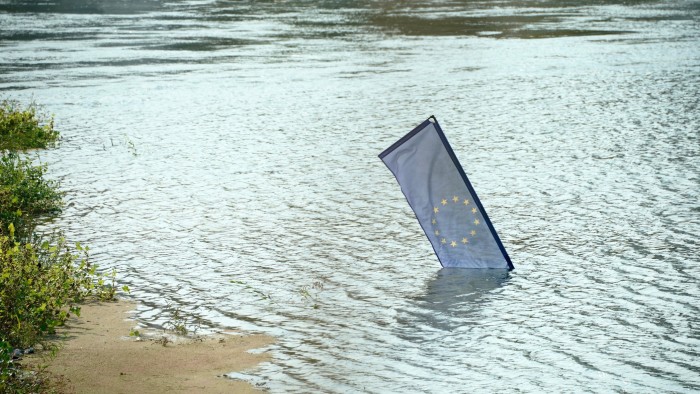The EU, traditionally among the most ambitious negotiators at the UN’s COP climate conferences, faces a formidable task this year: it must continue its drive to cut greenhouse gas emissions without much support from the US, its key ally.
“The EU’s push for ambitious climate outcomes at COP29 is crucial,” explains Chiara Martinelli, director at Climate Action Network Europe. “The EU, as a major historic emitter, also has a responsibility to push for a bold new annual climate finance target.”
Indeed, Brussels was a key force behind a deal in 2023 to shift away from fossil fuels and has long been the most significant donor of climate finance. Many of the main architects of the Paris agreement, which commits countries to keep global warming to within 1.5C of pre-industrial levels, were European.
However, these roles will be much more important at COP29 following the US election victory of Donald Trump — a climate sceptic who pulled the US out of the Paris agreement during his previous presidency.
The EU has introduced legislation to reduce emissions to net zero by 2050 but many of the laws require trading partners to adhere to the bloc’s standards. And, already, the demands are sparking a backlash, as the region pushes other countries to do more on a global level.
“Recent delays to critical environmental legislation” and “debate around reversing the 2035 fossil car ban, do risk sending a signal that Europe is not walking the walk”, Martinelli says.
For example, a landmark law seeking to ban products from deforested land from entering the bloc was last month delayed by a year.
In a letter to the European Commission, ministers from 18 producing countries, including Brazil, Ghana and Peru, said that many of their concerns had “not been addressed”.
Closer to home, a ban on internal combustion engines from 2035 has come under fire from the industry and the Italian government, which has said that new emissions limits for cars have created a “grave crisis” for Europe.
Yet catastrophic floods in Spain this month have exposed the damaging effects of climate change in the region.
Lars Aagaard, the Danish climate minister, recently told the Financial Times that the EU was “doing more than what is recognised” in policy but “we have to do more”.
EU ministers spent hours last month fighting over whether to commit to cutting emissions by 90 per cent by 2040, in its negotiating mandate for COP29. However, a push from more sceptical countries such as Poland ensured that percentage figure did not make it into the final document.
COP29 also takes place against a difficult geopolitical backdrop more widely: wars in the Middle East and Ukraine, the reinforcement by Brazil, Russia, India, China and South Africa of the Brics group of countries, and growing tension between developed and developing nations.
EU negotiators pushing to maintain the commitment from COP28 to transition away from fossil fuels have said that they face pushback from China and oil-producing states such as Saudi Arabia.
The EU’s policy, which includes the introduction in 2026 of the world’s first carbon border tax, is often cited as part of the problem, diplomats say.
“Unilateral measures are a favourite topic for Saudi [Arabia] and China to throw in the mix, whenever they are being asked difficult questions on mitigation,” notes one.
India, too, has strongly opposed the carbon border tax at the World Trade Organization.
And a group of countries, including India and China, is lobbying for EU climate rules to be scrutinised as part of the COP29 agenda.
As the main provider of climate finance globally, the EU’s role is “crucial” at this summit where diplomats hope to land an agreement on a new target for funding to help developing nations cut emissions, says Cosima Cassel, senior policy adviser at the climate think-tank E3G. The bloc contributed €28.6bn to climate finance in 2023, while the US figure was about $9.5bn.
“[The EU] can and should utilise their role as a bridge builder between the poorest, most vulnerable countries and countries such as the US and China,” Cassel says. “Especially in the context of the US elections, it’s really crucial that we have the EU’s engagement. It’s really time that EU leaders step up.”
Martinelli of CAN Europe adds: “A big thing missing from the EU is a clearer offer on the financial range they see for the goal, leaving developing countries concerned both for a lack of ambition and the ability to eventually agree and then deliver on numbers.”
EU officials and diplomats have been unwilling to discuss numbers until they have more commitments from other parties on the structure of the new goal, and their own contributions. Under discussion is a concentric approach that would set a smaller goal for public finance and would aim to leverage private funds towards a much larger target.
One EU official said that, while the European Commission wanted to put forward an ambitious figure on climate finance, “our hands are held by member states that don’t want to spend more”, and would like to see the donor base expand to developing, wealthy countries such as Saudi Arabia and China, before committing additional funds.
But Eamon Ryan, the Irish climate minister, says that, despite the “tricky” political and economic situation, with major economies such as Germany and France stagnating, Europe should “stretch our ambition” on finance.
“Europe still has a very significant economic capability and has real interest in getting this development and climate right,” he says.
Read the full article here

